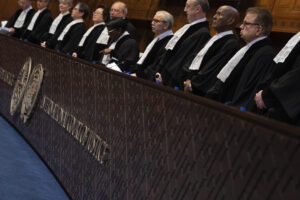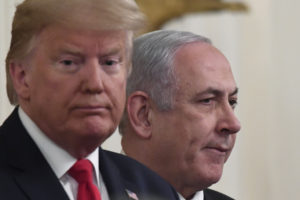Israel’s Apartheid Deepens, Along With Its Global Isolation
The real threat to Israel comes not from tiny, impoverished Gaza, but from the policies of the country's increasingly right-wing politicians.
Palestinian leaders are responding to the aggressive policies of Israeli Prime Minister Benjamin Netanyahu, deploying new legal strategies, and, in Gaza, a mass rally reminiscent of Arab Spring protest tactics. Palestinian Authority President Mahmoud Abbas is reportedly considering taking Israel to the International Criminal Court over Netanyahu’s recent announcement that Israel will build 3,000 new dwellings for settlers in the E-1 area of the West Bank. Abbas indicated that this step would be a last resort, but it is a threat to be taken seriously.
Hamas leader Khaled Meshaal joined a celebration of tens of thousands in Gaza over the weekend and repeated his long-standing opposition to ever giving up an inch of Palestinian land to Israel. Israeli politicians condemned him for refusing to recognize, and wanting to destroy, the Israeli state. Israeli opposition leader Shaul Mofaz of the Kadima Party said that Meshaal should have been assassinated while in Gaza. None of the Israeli leaders who condemned the Hamas leader seemed to grasp that the real threat to Israel comes not from tiny, impoverished Gaza, but from the policies of Israel’s increasingly right-wing politicians.
By denying the Palestinians a state, Israelis are actively destroying the Palestine they agreed to create in the Oslo Accords that Israel signed in 1993.
Israelis prevent Gaza from exporting most of what it makes. The territory is denied an airport or seaport, and severe restrictions are placed on imports, plunging many of the Palestinians there into food insecurity and creating high incidences of anemia. In the West Bank, Israeli authorities are resorting to an ever more robust Israeli apartheid, which the world is signaling it will not accept.
Meshaal’s triumphant visit to Gaza underscored the new limitations on Israeli power. Netanyahu’s recent attack on Gaza remained a brief air war, and, unlike in 2008-2009, could not be escalated into a land incursion because of opposition to that step in Washington, Brussels and Cairo. Egypt’s fundamentalist president, Mohamed Morsi, played a key role in negotiating a cease-fire, but those talks themselves limited the scope of Netanyahu’s ability to act unilaterally.
Netanyahu stubbornly refuses to get the message. His settlement project in E-1 would cut the West Bank in two and forever forestall the emergence of a Palestinian state. U.N. Secretary-General Ban Ki-moon referred to the plan as “an almost fatal blow” to any two-state solution.
The declaration came just after the United Nations General Assembly humiliated Israel and the Obama administration by elevating Palestine’s status to “nonmember observer state,” with 138 delegates in favor of the upgrade, nine against and 41 abstaining. That overwhelming sentiment in favor of the Palestinians had been stoked by Israel’s attack on Gaza in November. Netanyahu moved quickly to remind the world that while the General Assembly might be able to play symbolic political games, he controls the land, water and air of the Palestinian West Bank, and intends permanently to annex all three to Israel, even as he keeps the entire population of the Gaza Strip under an economic blockade. Abbas has riposted by reminding Netanyahu that Palestine’s new status gives it access to international forums in which he can press his case.
Think of the Palestinian West Bank as a peanut with a curve in it in the middle on the left. Jerusalem is in the crook of that curve. After the Israelis invaded and occupied Arab East Jerusalem and the West Bank in 1967, they gradually annexed part of the latter territory to their “district of Jerusalem.” In the last few decades, they have aggressively constructed Israeli housing projects on Palestinian land around Jerusalem, encircling the city to the west.
Building a new, large settlement in the E-1 area between west Jerusalem and the big settlement of Maale Adumim just nine miles from the Dead Sea border with Jordan would virtually slice the West Bank in two, making a contiguous Palestinian state impossible. The West Bank was already carved up by checkpoints and highways (some Jewish-only) into a set of tiny Bantustans. But now the whole territory is to be sundered, just as Solomon offered to cut the disputed newborn in two.
That Netanyahu and his partners intended to make a Palestinian state impossible was never in doubt, but their boldness in pressing forward to implement this plan has shocked the capitals of Europe. In response to the announcement about E-1, the British and French foreign ministries took the unusual step of summoning their Israeli ambassadors for a dressing-down, and there were rumors that they were considering withdrawing their own ambassadors from the country.
British Foreign Secretary William Hague was reportedly furious at Netanyahu, feeling betrayed because he had expended a great deal of political capital on behalf of Israel in opposing “observer state” status for Palestine. French President Francois Hollande warned Israel that this proposal was not the way forward to peace, but denied that he was considering sanctions against the nation. That anyone even asked such a question, however, is a sign of the incredible shift in world opinion against Israel’s policies.
The public pressure on European governments for some sort of sanctions in response to apartheid policies will only grow. Already, courts have found that goods imported into the European Union from Israeli companies on the occupied West Bank are not eligible for tariff discounts, unlike those coming in from Israel proper. The major Unison labor union in Britain is boycotting Israel, and the country’s fifth-largest food chain, the Co-Op, is declining to import agricultural goods from Israeli settler farms on Palestinian territory. Throughout Europe, labor unions, pension funds and universities are increasingly divesting from firms seen as profiting from or enabling the occupation of the West Bank. In response to Israel’s attack on Gaza in November, 52 prominent activists and artists, including Nobel laureates, called for an international military boycott of Israel.
Netanyahu’s Gaza War fizzled out and its quick end seems mainly to have resulted in greater popularity for Hamas and for its new patron, Morsi. Netanyahu’s campaign to prevent the nations of the world from recognizing Palestine as an observer state was an epochal failure. Palestine’s new status as a U.N. observer state gives it potential access to the International Criminal Court, a way possibly to fend off aggressive Israeli colonization of its territory. Netanyahu’s announced intention to annex more Palestinian land in E-1 and chop the West Bank permanently in two resulted in his ambassadors being called on the mat and a clear recognition that he is not so much unserious about a peace process as dead set against one.
Because of overwhelming American support, especially in Congress, and because of the vast amounts of money and arms the U.S. has provided, fortress Israel can forge ahead with its colonization project if its leaders so choose. But Israel cannot escape the two inevitable consequences of this action. If it denies the Palestinians a state and insists on keeping Palestinian land, then it will become responsible for resolving the dire problem of Palestinian statelessness. And until it does that, Israel will increasingly be seen as an apartheid state and come under debilitating sanctions, first from civil society and then from governments.
Your support matters…Independent journalism is under threat and overshadowed by heavily funded mainstream media.
You can help level the playing field. Become a member.
Your tax-deductible contribution keeps us digging beneath the headlines to give you thought-provoking, investigative reporting and analysis that unearths what's really happening- without compromise.
Give today to support our courageous, independent journalists.









You need to be a supporter to comment.
There are currently no responses to this article.
Be the first to respond.